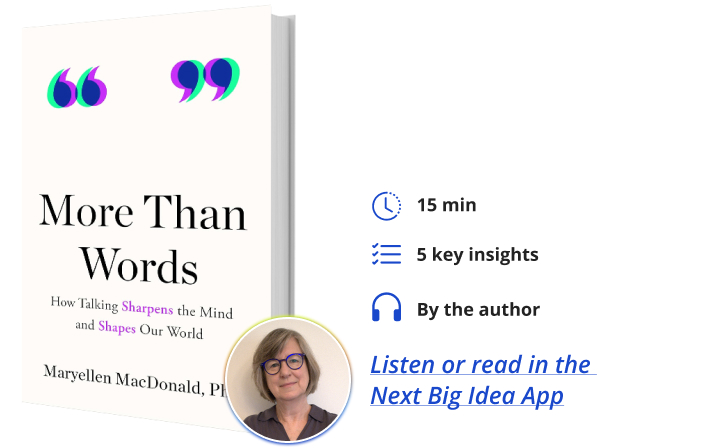Maryellen MacDonald is a psycholinguist—meaning someone who studies how our brains learn and use language. She is the Donald P. Hayes Professor Emeritus of Psychology and Language Sciences at the University of Wisconsin-Madison.
What’s the big idea?
When we talk, we’re mostly focused on the person listening—are they understanding our point? Do they like us? And so on. What many people don’t realize is that the act of talking has profound effects on the person doing the talking. These effects are mostly hidden, and they’re almost all overwhelmingly positive. More Than Words brings those benefits of talking to light.
Below, Maryellen shares five key insights from her new book, More Than Words: How Talking Sharpens the Mind and Shapes Our World. Listen to the audio version—read by Maryellen herself—in the Next Big Idea App.

1. Talking is a tune-up for your mind.
The act of converting internal ideas into talking increases your mental focus, tunes your perceptual senses, and helps you follow through with goals. You get these benefits of talking no matter what form of talking you use, be it speaking directly to another person, signing in a sign language, writing a memo for your team, or even just talking to yourself in your head. From here on out, I’m going to call all these ways of producing language “talking.”
The benefits of talking are a natural consequence of the way talking works. Suppose you want to say, “Can I get fries with that?” Behind the scenes in your brain, a lot of mental work is going on to enable you to say this simple sentence. We have over 50,000 words stored in our memories, and to turn our internal idea into a sentence that orders fries, we’ve got to find the exact six words we need: can, I, get, fries, with, that. Retrieving exactly the right words from the 50,000 sitting in memory requires real mental focus on the ideas we want to convey. The focus we exert to get talking spills over to other aspects of our lives.
When you need to focus, try talking. If you’re trying to find your keys in your cluttered office, try saying, “Keys, keys” while you’re searching. If you need to stay on task, state your goal and why it’s important. Research shows that this type of self-talk, talking to yourself aloud or in your head, has real benefits for mental focus and follow-through. You may already have heard that athletes are coached to self-talk like this to improve their focus, determination, and performance in their sport. You don’t have to be an athlete to let talking sharpen your mind.
2. Talking regulates emotions.
When we’re in a highly emotional state, we often don’t know quite what we’re feeling. We might be able to say we’re “upset,” but this could mean many things, like scared, angry, worried, and so on. Talking about what we’re feeling—making the effort to name our emotions—makes our feelings clearer. Focusing on our feelings to find the words that naturally name them brings order to what was previously unclear.
“Brain imaging studies show that the act of naming unpleasant emotions quiets down neural activity in the limbic system.”
Naming negative emotions also helps us deal with those negative feelings. Brain imaging studies show that the act of naming unpleasant emotions quiets down neural activity in the limbic system, a brain network that controls emotional responses. As a result of reduced limbic system activity, we’re calmer and more able to think through difficult situations without compulsive fight or flight reactions. You can experience the benefit of naming emotions when you’re communicating with someone, but it’s not essential to have someone else involved in the conversation. You can still benefit from naming how you’re feeling, even if you’re just talking about it to yourself.
3. The importance of children’s talking.
Talking doesn’t just benefit adults. It also tunes kids’ brains. Children’s own talking and the rate of back-and-forth conversations with grownups is at least as important as the sheer number of words a child hears. Children are receiving a beneficial mental workout by engaging in conversations with others. Studies show that young children’s talking increases their mental focus, learning, vocabulary, and readiness for school.
These benefits of kids’ talking have big implications for parenting choices. Since most parents don’t know about the benefits of a child’s own talking, they’re not necessarily worried about their kids watching media on TV, phones, or tablets. As long as this media is child-appropriate, it may just seem like more language input for the child to absorb. But this kind of parenting decision looks different from the perspective that kids need to be talking and conversing. When kids are glued to their screens, they’re not talking, and parents aren’t talking to them.
Researchers have found that high rates of media consumption by young children are associated with reduced brain development, vocabulary, and school success. You can see why the American Academy of Pediatrics recommends that babies have no media exposure and that children aged two through five have no more than one hour of media per day. Kids need to talk and converse, and that’s not happening when they’ve got a screen in front of them.
Oh, and parents? You may want to reconsider your own phone use when your kids are around. Sometimes you need a break, but if you’re deep into scrolling when your kids want to talk to you, they’re missing out on conversations, and you may be conveying the message that screens are more important than human interaction.
4. Writing it down will tune it up.
“I write,” said the essayist Joan Didion, “entirely to find out what I’m thinking.” Even if you’re not an author, you can use writing to gain clarity in your life. Writing is a form of producing language, or “talking,” and all forms of talking have these benefits. But for generating maximum clarity about a confusing or troubling situation, writing seems to give us an edge over speaking aloud or talking in our heads.
Writing is often the strongest driver of insight because it’s a slower process, and that means writing affords more time for reflection. You do have to take time to reflect to get the added benefits of writing—quickly jotting something on a napkin isn’t likely to lead to enlightenment. Thoughtful, reflective writing has been repeatedly shown to be a beneficial exercise for gaining clarity. Writing is also well-suited to becoming a regular practice, such as journaling for 10 or 15 minutes a day.
“Thoughtful, reflective writing has been repeatedly shown to be a beneficial exercise for gaining clarity.”
Sometimes, therapists assign their clients to keep a journal. Usually, the therapist is never going to see the journal, so what’s the point of this assignment? Regular writing in the journal benefits the one doing the writing. It doesn’t matter if no one else sees it. Types of talking that have nothing to do with communicating with someone can help you understand what you’re thinking and feeling. Studies have found that regular engagement in thoughtful writing exercises can have benefits for both mental and physical well-being, as well as for achieving goals, with effects lasting for months or even years.
If you’re inclined to give writing a try, there are many resources on the internet. You’ll find descriptions of different kinds of writing exercises, such as a daily journal with prompts to get you started, or a focused, three-day exercise writing for 20 minutes about one difficult issue that’s troubling you. Writing and reflection will require mental work, but you should make other aspects of the practice as easy as possible to fit into your life. Set a reminder to write, keep a notebook handy, do the writing on your phone—whatever gets you started and keeps you going.
5. Society needs to embrace more talking.
There are myriad benefits of talking, but society is holding us back from realizing many of them. Talking is well known to boost learning both in and out of school, but our education system is fixated on learning through avoiding talking.
The standard learning method, from elementary through college, is for students to sit still, be quiet, and listen to the instructor or read a textbook. Many studies show that students retain very little from this passive learning format and learn much better when they discuss and interact with the material.
“Our education system is fixated on learning through avoiding talking.”
Obviously, we can’t have 30 fourth graders talking all at once in a class, but depending on the grade level, there are strategies for boosting rates of talking in school. These include active learning exercises where students often work in pairs or small groups to discuss, solve problems, or interpret new material. Since writing is a form of talking, writing assignments are another great route to learning.
A big caveat here is that the student won’t get any learning benefit if they let an AI program write the material for them. Despite abundant evidence that talking is a learning accelerator, it remains to be seen if there will be any changes to our current no-talking culture in education.
Similarly, research on older adults shows that talking also tunes their brains. Conversation and social interaction is a powerful force in maintaining mental health and staving off dementia. Unfortunately, older adults’ social networks and talking rates often collapse at the time of retirement, leading to more isolation and cognitive decline. There are massive emotional and economic costs to individuals, families, healthcare, and broader society from the growing number of people with dementia, but so far, there’s very little being done to harness the power of social interaction and talking to boost senior citizens’ cognitive health.
Enjoy our full library of Book Bites—read by the authors!—in the Next Big Idea App:
































